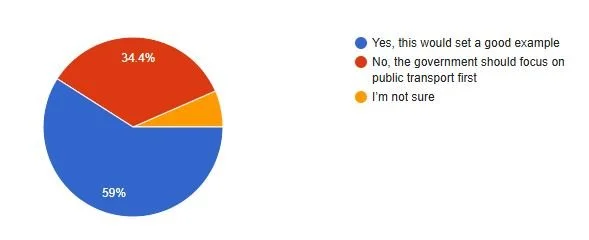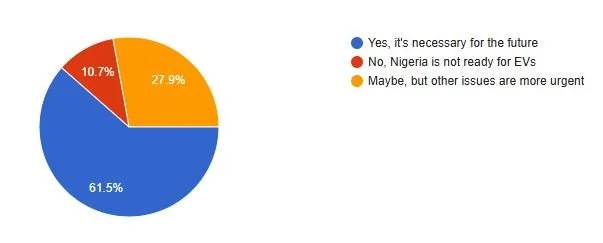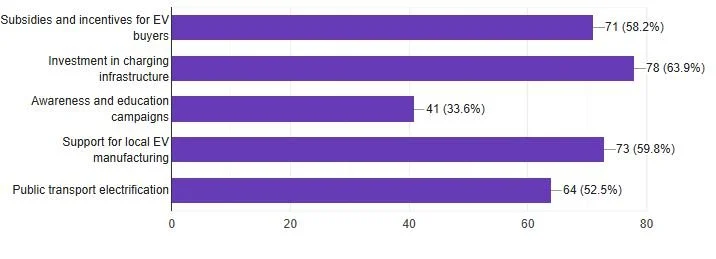Why Nigeria’s State House Should Lead the Electric Vehicle Revolution
What if Nigeria’s most powerful statement on climate action wasn’t just a speech but the President’s motorcade? Imagine Abuja’s streets, where the State House leads by example with a fleet of electric vehicles (EVs), signaling a commitment to a cleaner, more sustainable future. The impact would be more than symbolic. In 2024 Nigeria spent over ₦4 trillion on fuel subsidies, straining public finances while worsening air pollution. Since transportation contributes nearly 30% of Nigeria’s CO₂ emissions, adopting EVs for official government use could reduce costs, curb reliance on imported fuel, and accelerate the nation’s shift toward green mobility.
Recent data from a survey by the Youth Climate Collective under the Drive the Future campaign reveals that Nigerians are for change. Respondents across 14 states and the Federal Capital Territory showed that there's a need for the Nigerian government to prioritise electric vehicles. Nearly 60% of those surveyed believe the government should be the first to make the transition.
1. A Strong Public Mandate for EV Adoption
The survey shows that 62% of respondents want the Nigerian government to prioritize EV adoption, signaling strong public support for cleaner transportation. This isn’t just a passing trend, it’s a demand for forward-thinking leadership. Why does this matter?
Transitioning the State House fleet to EVs would be more than symbolic. It would be a strategic move to normalise electric mobility in Nigeria’s policy and social imagination. It sets a visible precedent, signalling that Nigeria is ready to align with its Nationally Determined Contributions (NDCs) under the Paris Agreement, where the transport sector accounts for an estimated 22% of the nation’s greenhouse gas emissions.
Fig 2. Poll result from the survey question: Should the government start by adopting EVs for official vehicles?
Fig 1. Poll result from the survey question; Do you think the Nigerian government should prioritize the adoption of electric vehicles?
2. Leading by Example: The State House’s Crucial Role
The majority of our respondents want the federal government to lead by transitioning its fleets to EVs first - recognizing that real change starts when leaders adopt new technologies. Government EV adoption would transform public perception overnight, turning skepticism into trust as ministers and officials use these vehicles daily. This visible commitment would prove EVs' reliability for Nigerian conditions while leveraging the government's influential position to reshape market attitudes.
Beyond symbolism, such a move would create powerful economic ripple effects. Corporations would follow suit, electrifying their fleets and creating demand for charging infrastructure and local servicing. Most importantly, it would signal to global automakers that Nigeria is serious about EVs, potentially attracting investments in local assembly and clean mobility startups. Rather than remaining dependent on imported used vehicles, this could position Nigeria as a hub for sustainable transportation innovation in Africa. The public understands this potential - now leadership must act to unlock it. As one survey respondent noted: "It’s about time Nigeria shifts its dependence on fuel and focuses on renewable and sustainable energy.”
3. Tackling Environmental Concerns Head-On
56% of respondents expressed deep concern over the environmental and health impacts of petrol and diesel vehicles. An additional 30% are somewhat concerned, signalling a population that is increasingly conscious of pollution, urban air quality, and the broader climate crisis.
Adopting EVs would directly contribute to:
Reducing urban air pollution, particularly in congested cities like Lagos and Abuja.
Lowering Nigeria’s carbon emissions, aligning with global efforts to limit warming to 1.5°C.
Fulfilling youth and civil society demands for proactive climate governance.
As one respondent put it: "The adoption of EVs in Nigeria would be a great start and a step in the right direction towards energy efficiency and sustainability."
4. How the Government Can Accelerate EV Adoption
Fig 3: Poll results from the survey question; What kind of support should the government provide to encourage EV adoption?
The survey outlines a clear public mandate for Nigeria's EV transition, with charging infrastructure (64%), local manufacturing (60%), and buyer incentives (58%) emerging as top priorities. Nigerians recognize that widespread adoption requires both enabling infrastructure and affordable access, while seeing domestic production as key to economic benefits. These practical concerns are complemented by calls for electrified public transport (52%) and awareness campaigns (34%), forming a comprehensive roadmap for progress.
For the State House, immediate action should start with converting government fleets to EVs, partnering on charging infrastructure, and introducing targeted incentives. Launching electric bus pilots would demonstrate commitment while addressing urban air quality. As respondents emphasized, success requires coordinated policies - from manufacturing support to renewable-powered charging - that together can position Nigeria as a regional leader in sustainable mobility.
5. Overcoming Challenges: Electricity and Perception
One common concern from the survey was Nigeria’s unstable power supply. A respondent commented: "Nigeria needs to sort out electricity issues first before we can really discuss EVs." While the concern is valid, it should not paralyze progress. Innovative solutions already exist that can circumvent grid limitations: solar-powered charging stations can operate independently, battery-swapping systems have proven effective in Kenya and China, and hybrid transition models allow gradual adoption while infrastructure improves. History shows that waiting for perfect conditions often means never starting at all; Nigeria's EV transition must begin now, adapting solutions to current realities while simultaneously working to strengthen the national power infrastructure. The energy transition isn't an all-or-nothing proposition, but rather an iterative process where each EV deployed and each solar charger installed helps build momentum toward a cleaner transportation future.
The State House Must Act Now
The survey results are clear: Nigerians want EVs, and they expect their leaders to lead the charge. By adopting electric vehicles for official use, the State House can:
Inspire nationwide EV adoption
Reduce pollution and carbon emissions
Boost local manufacturing and green jobs
Position Nigeria as Africa’s climate leader
The question isn’t if Nigeria should embrace EVs, it’s how fast the government will act. The State House has the opportunity to accelerate this transition. The public is ready. The technology is here. Will Nigeria’s leaders take the wheel?



